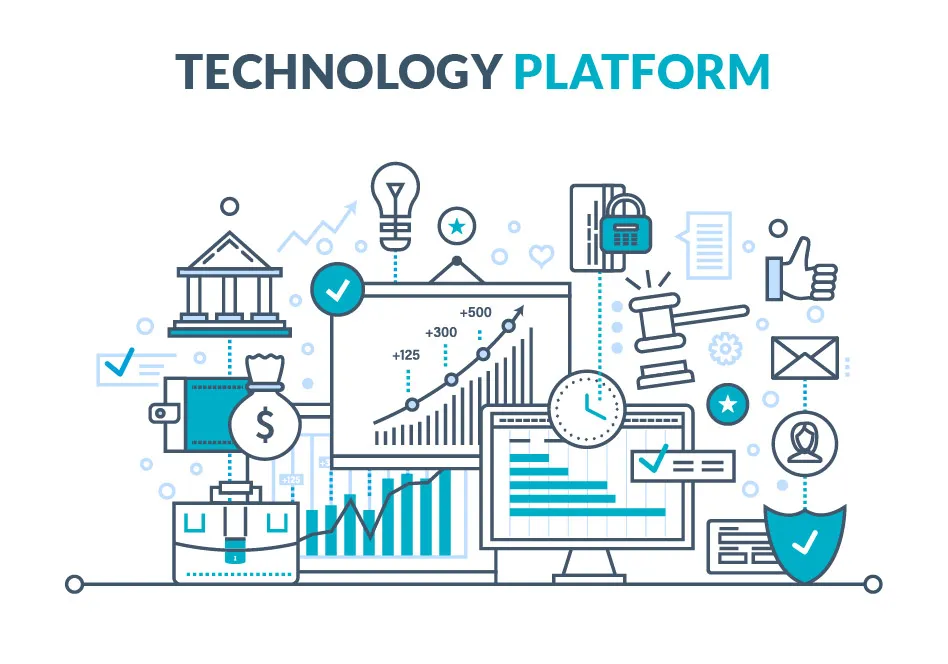Remote ERP Implementation: Why this is
the better Approach
for you in the Long Term
the better
for you
When an ERP system is implemented in remote mode, project stakeholders sometimes experience initial difficulties. Working in smaller stages, which is favored by a remote implementation, can make the organization and coordination of the ERP project difficult.
1. Easier Access to ERP Add-ons and Innovation
ERP systems already master many functions today. However, they are not always able to completely cover the functionality requirements of a company. For this reason, there are add-ons, which are either provided by the ERP vendor or by a third party.
The need for ERP add-ons is likely to increase even further as the number of new software solutions continues to grow. One reason for this is new developments and trends, such as the growth of mobile computing and wearables.
This requires more and more data and applications to be integrated faster and faster. In addition, the life cycles of applications are becoming shorter and shorter and they are being replaced by new applications more quickly.
Software can often be implemented faster and more flexibly in remote mode. There is also often a greater choice of specific software solutions available. This allows companies to find the required ERP extensions and other software solutions more quickly and keep pace with innovation.
In this context, it is advantageous if the ERP system has already been implemented remotely beforehand. This lays a solid foundation for the success of further remote implementations. For example, the technical and organizational processes have already been set up and tested. The employees involved in the remote implementation of the ERP system will also already have important knowledge and experience that they can use profitably in subsequent remote projects.
In addition, in the case of a remote implementation of the ERP software, you will usually opt for an ERP vendor who has appropriate experience. This ERP partner is also able to support the ERP system, including the add-ons or extensions, remotely over the entire lifecycle and can often act as a competent contact for all questions relating to remote implementations.
If the current ERP vendor needs to be changed, for example because it has been bought out and the service is discontinued, a remote mode offers more options when searching for a new ERP partner.
As a rule, ERP systems from the cloud are the first choice for remote implementation and support. One example of a cloud-based ERP system that is well suited to remote implementation is Microsoft Dynamics 365 Business Central.
For this ERP solution, there is also an extensive and constantly growing selection of add-ons and other extensions available. This allows a company to expand the functionality of its ERP system as required and become innovative and competitive.
2. Conflicts in the ERP Project and in the follow-up Support Phase are reduced
The human factor is often underestimated in ERP projects and in the subsequent support phase. However, it contributes significantly to the success of a collaboration.
Basically, the closer people work together physically or spatially, the more they have to coordinate their working methods with each other. This is not only about technical matters, but also about personal matters. If coordination fails, friction is the result.
In phases in which the workload in day-to-day business or in critical project phases increases sharply, the potential for conflict rises again significantly. ERP and other projects can be severely delayed or even fail as a result.
It is therefore important that both the employees of the ERP vendor and those of the customer have a direct line. This ensures that the cooperation in the ERP project and in all other joint tasks is successful.
In some cases, the spatial distance and more flexible way of working made possible by remote projects can facilitate collaboration.
It is true that the physical distance involved in remote projects can also have disadvantages. It often increases the coordination effort. Under certain circumstances, however, it can be more important for project success to accept additional effort for coordination for example, by entrusting a professionally experienced person with the additional tasks.
An expert person who coordinates the project processes and allocates or delegates tasks flexibly can not only increase the productivity of the employees in the remote project, but often also do something against emerging disagreements and conflicts.

Your Change Project: Does it
have a Real
Project Sponsor
or just a Paper Tiger?
have
Project
or just a
3. ERP Project Progress can be controlled more individually
A frequent reason why ERP projects fail or are severely delayed are project employees who are not sufficiently relieved of their day-to-day tasks. Especially during stressful project phases or frequent order peaks in day-to-day business, this can quickly lead to a drop in performance or even burnout among key employees. In addition, a sharp increase in workload can lead to key employees leaving the company prematurely.
The scope for action due to the more flexible work organization that remote mode offers for project work is then quickly exhausted.
In general, the aim should be to ensure that ERP and other projects and tasks are completed on schedule. However, in special circumstances - e.g. unusually high peak loads in day-to-day business - it can make sense to slow down a project or take an interim break. In the context of a remote implementation of an ERP system, this can often be realized more easily and with less effort than in the context of a conventional ERP implementation.
The ability to flexibly control the project speed can play an even greater role if an ERP system is to be implemented in several subsidiaries. This can prevent or reduce employee overload and other undesirable developments in the project, the likelihood of which then increases significantly.
Managing a remote ERP projects is a bit like riding a bicycle with multiple gears. If the road becomes more difficult, one or more gears can be shifted down. Although this slows the ride down, it can still be continued safely and reliably. If the path becomes easier again, the gears can be shifted up and the ride accelerated.
Another common reason why ERP projects stall or fail is the lack of support from the top management of the company implementing the ERP system.
Those responsible at top management level often have to perform several other important tasks in addition to an ERP project. As a result, the ERP implementation can take an unfavorable course due to under-prioritization. In such situations, it may make sense to slow down the ERP project in order to prevent its failure. This, in turn, is easier to realize with a remote implementation of an ERP system.
Alternatively, the tasks can sometimes be (partially) delegated to the ERP vendor. The managers of the company implementing an ERP solution can thus be more strongly supported and relieved.
4. ERP Support becomes faster and more efficient
During the term of the ERP project and the subsequent support phase, quick support is important if problems occur. If the ERP system or its extensions do not function correctly, this not only affects work processes in the company using the ERP, but also its customers.
The longer an error persists, the higher the direct and indirect costs. Remote implementation and follow-up support ensure that specialist support is available more quickly and problems are resolved more quickly.
It is often less complicated for the ERP vendor’s employees to find time to clarify a customer’s questions in a video conference or to carry out a remote system reconfiguration than to visit the customer hundreds of kilometers away and carry out the corresponding tasks on site.
If the company implementing an ERP system has multiple subsidiaries, the benefits of remote support can be even more significant. The savings in time and costs are even greater.
5. The Development of the ERP Eco-system is favored
Today, an ERP system, whether with specific add-ons or without, is increasingly dependent on comprehensive and coordinated data exchange with other software systems. The reason for this lies in the ongoing digital transformation.

Full Software
Integration With a Technology Platform
Examples of such systems are (I)IoT technologies, web-based EDI (Electronic Data Interchange), which enables data exchange in the B2B sector, or special e-commerce platforms.
In this ecosystem, the ERP system plays a central role in the processing of business transactions. For example, more and more IIoT solutions such as predictive maintenance (PdM) are now being connected to the ERP system. In this case, the IIoT sensors installed in devices, machines and systems report current wear conditions and special software individually estimates the remaining service life of the components.
If a maintenance or repair is due, the IIoT system automatically transmits the corresponding data to the connected ERP software. Based on this data, an order can be generated at the correct time for the customer service of the responsible service provider. The required materials can also be ordered using the ERP software.
To ensure that the data exchange between the ERP system and other software systems works seamlessly, efficient integration processes are increasingly important today. This is where web-based integration platforms come into play. They are also known as iPaaS (Integration Platform as a Service). Microsoft, for example, offers such an iPaaS solution with Azure Logic Apps.
As the trend towards remote implementations is also gaining importance in the integration of other software systems, a previously remotely implemented ERP solution has advantages here too. Employees of the ERP-using company will then already have appropriate experience.
The ERP vendor who implemented and maintains the ERP system in remote mode is often a suitable contact person for further ERP-related remote projects. They are usually familiar with the relevant working methods and have set up and tested the necessary processes.
If necessary, this ERP partner can often support the implementation of specific extensions and integration work from remote or work remotely with other software or integration service providers of the company it supports. This can often both speed up the service and save costs.



 Now it's getting serious!
Now it's getting serious!
